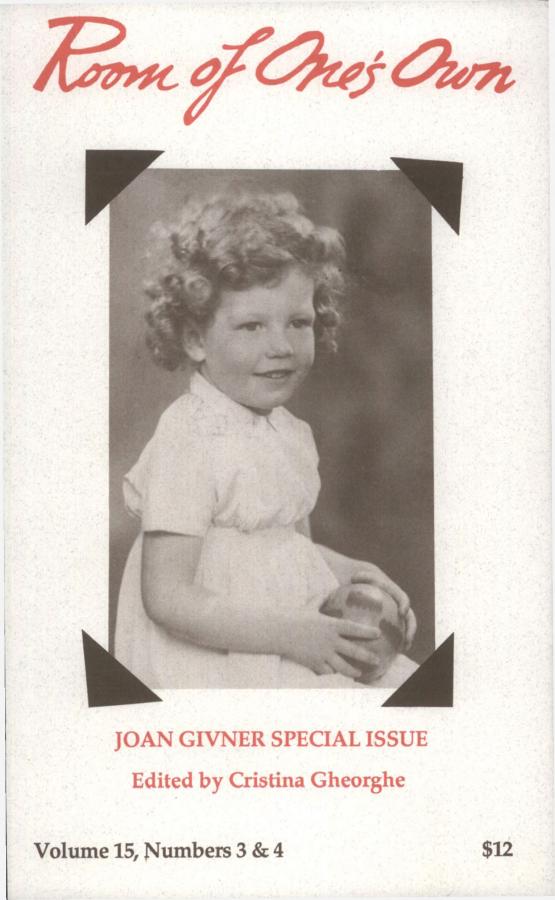ROOM 15.3 & 15.4 Joan Givner
1992
Digital only; out of stock in print.
The present introduction explores some of the challenging aspects of Joan Givner’s work, auto/biographical forms of discourse that could easily fit under the umbrella term life-writing, which includes both non-fiction and fictional discourse. The stories reprinted in this special issue of Room of One’s Own or those published here for the first time have been selected not only for their artistic quality but also for their feminist content and social goals, and for their literary
strategies informed by theory that result in a continuous crossing of genre borders.
Joan Givner is a literary biographer, short story writer, playwright and English professor, who teaches feminist criticism and life-writing courses, edits the Wascana Review and is a contributor of critical reviews to various journals. She has written two literary biographies, on Katherine Anne Porter (Katherine Anne Porter: A Life, 1982) and on Mazo de la Roche (Mazo de la Roche: The Hidden Life, 1989), a related volume of interviews (Katherine Anne Porter: Conversations, 1987), three volumes of short stories of admittedly autobiographical nuance (Tentacles of Unreason, 1985, Unfortunate Incidents, 1988 and Scenes from Provincial Life, 1991), as well as numerous critical articles and reviews. She has recently finished a play entitled Mazo and Caroline (1991) which was presented at the Saskatchewan Play wrights’ Spring Festival in Regina. Her autobiography, The Self Portrait by Joan Givner of a Literary Biographer, will appear in 1993. She is currently working on her first novel, The Foetus. In 1991 she was awarded the CBC prize for best short story, for “Elizabeth.”
The common characteristic of all her writings is a resistance to the inherited epistemic definitions of personal and socio-political values. Givner aims her creative efforts at exploding the static personal identity and replacing it with a perpetual process of dynamic self-dis covery that is featured in all her auto/biographical writings. She creates a new, alternative world embodied in a rebellious discourse composed of what might be called countersigns, counterimages, or counterfictions, anchored in and drawn from reality. Those counter signs — such as genderless characters, or border-crossing stories that read like auto/biography and literary biographies that read like stories — are presented to readers in life-writings. The rebellious signs are meant to re-enter, through the process of reading, the real world outside of her texts, and once there, to challenge the signs, images and fictions imposed on her readers by the oppressive authority exercised by networks of social power. By reading Givner’s work, her readers are armed to rebel against a pre-packaged, stifling version of life.
Givner questions, through the varied forms of her work, the possibilities and dangers of creating or decoding feminine identity — the woman’s awareness of her own self— as a sign of discourse. She takes into account the continuously changing rules of what is ac cepted by the controlling cultural institutions as valuable (the canon), the multiple rules of the long-neglected feminine discourse in general (its imposed marginality) and of the auto/biographical writings by women in particular. While actively engaged in multiple forms of literary activities, Givner displays a high political awareness of the much-needed poetics and social praxis of contemporary women’s writing.
—Cristina Gheorghe

Price range: $10.00 through $21.00
Additional information
| Delivery | Canada, USA, International, Digital |
|---|
In this issue: Cristina Gheorghe, Joan Givner, Barbara Godard, Ann Jansen